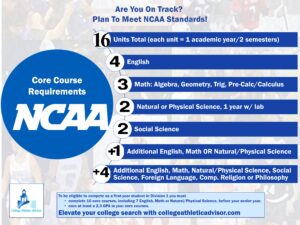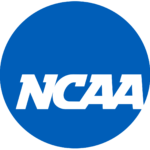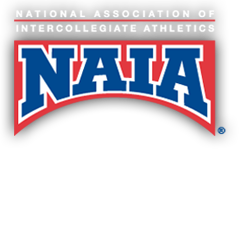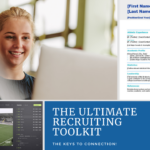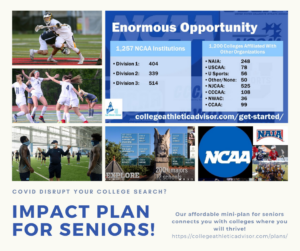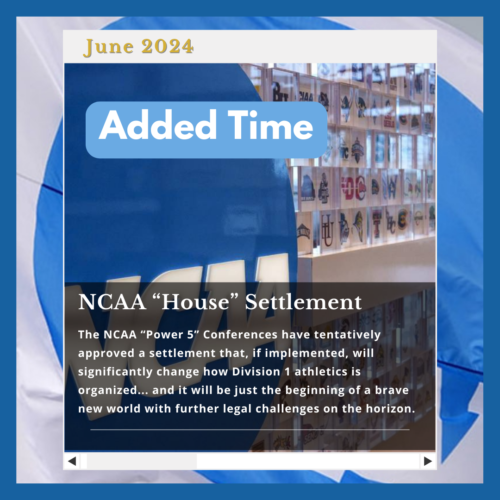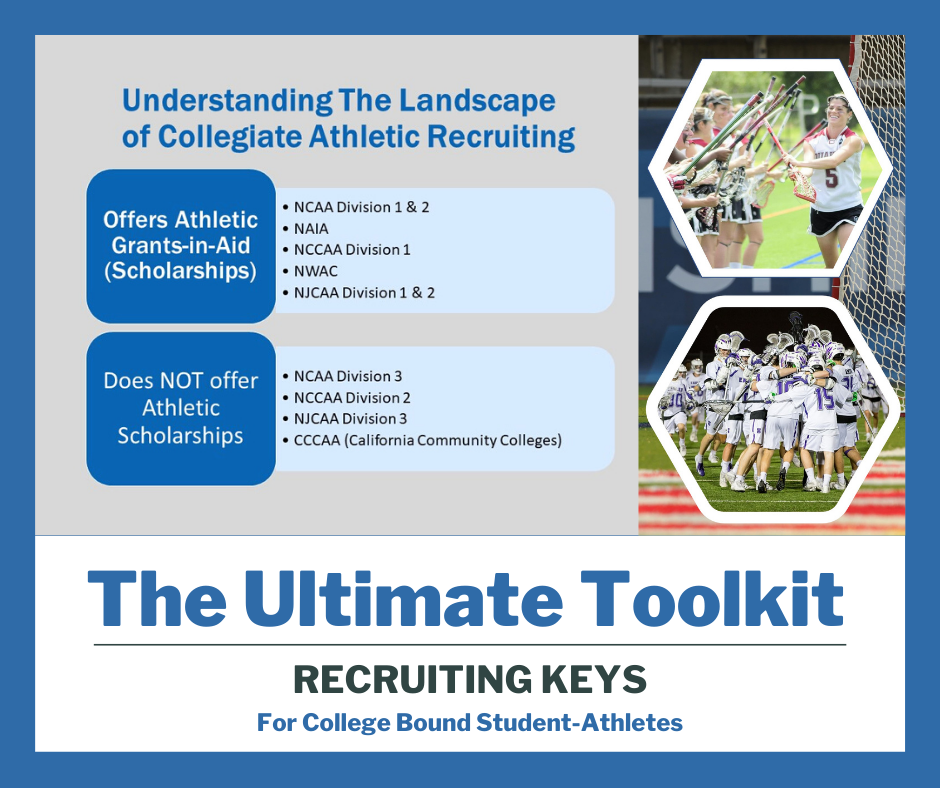Dual Track College Search Time Line
College Athletic Advisors' Unique Academic Benchmark and Athletic Recruiting Key Resource
High School Year
Academic Planning Benchmarks
Recruiting Timeline
Freshman students should focus on enjoying high school, learning about themselves holistically, planning their academic path, and involving themselves in the life of their school and the world around them.
- Learn time management skills. Balance academics, social interests, and extracurricular passions.
- Get involved! Explore extracurricular life and community service. Try out for plays, join a club to explore your interests or hobbies, play an instrument, sing, serve.
- Expand your friendship group. Reach out and meet new people, connect with groups that share your interests (even if it's on Zoom).
- Take advantage of the opportunity to meet with your teachers outside of class when you have questions or want to explore a topic further.
- Get to know at least one adult (advisor, coach, teacher) in the community well to help you navigate High School.
- Make time to read for pleasure. Read a novel. Read a newspaper.
- Work hard in school.
- Select your academic courses and set goals with the help of your advisor. You should seek appropriate challenges and balance. You need to enjoy your classes and do well, and still have time for other aspects of life.
- Use your summer to continue to expand your horizons. Find a job, take a class, continue with your art or music, attend sports camp, volunteer.
- In addition to playing in your high school’s athletic program, challenge yourself with a club team that trains regularly.
- Do not let ANYONE pressure you to specialize on one sport. Cross training is important and useful. Make sure you get an off-season from your primary sport. You will appreciate it!
- If you can’t stand to be away from your primary sport… follow your passion!
- Make sure you’re enjoying your sports participation and experiment with new things!
The college process becomes more concrete with your first standardized test. The PSAT test can help you begin to gauge testing strengths and weaknesses.
- Keep adjusting your academic plan to meet your needs as you mature and your goals become more concrete! Look to challenge yourself with AP or IB courses if appropriate.
- Get and stay involved - drama, music, sports, art, service, etc. You still have time to explore new activities.
- Stay balanced. Don't feel that you must do it all; do what you do well.
- Put in the effort to reach for your academic potential.
- Take the PSAT in October. Prepare by closely reading the practice materials, taking and scoring the sample test provided by the testing service. If you have questions about some of your errors, speak to your math or English teacher.
- Review your scores from the PSAT when you receive them in December. If your selection index is over 180, you might consider preparing for the exam in 11th grade as you could qualify for the National Merit program.
- Consider pursuing an academically related interest outside of class. Join a club, develop a project, volunteer in your community or start a "business" (you don't have to make a profit, by the way), collaborate with friends in way that allows you to explore your subject!
- During the spring or as a sidelight on a family trip, swing by a college campus or two to begin to get a feeling for the types of schools that you find appealing - large, small, urban, rural, strong campus feeling, etc.
- Again, use your summer to continue to expand your horizons. Find a job, take a class, continue with your art or music, attend sports camp, do a language immersion program, find and internship, use your energy positively!
- Talk to your coaches about your aspirations to play beyond high school. Listen carefully to their feedback, ask for input in terms of what they feel you can do to improve or be seen. College Athletic Advisors can help connect you with knowledgeable resources to assist you!
- Your coach may share interest from certain college coaches (especially on the girls side) at this level. Make sure you are playing in events where college coaches can see you play. If your team is not playing at that level, explore avenues to “guest play” in these events. College Athletic Advisor can help connect you to playing opportunities if you need help!
- Remember that you are participating in sports primarily to have fun and enjoy the experience!
- You can contact non-NCAA coaches and they can respond to you. NCAA coaches are limited in their ability to respond. There are NO restrictions on what YOU can send to coaches!
11th Grade
(Junior Year)
Fall Semester

Take the stress out of your college search process! Set up an initial consult today!
Junior year is the best time to really begin to see your college search as part of your current academic and life plan. Getting control of your college search and being responsible about these benchmarks will give you the best possible options going forward, and give YOU the most control of your future!
- Fill out FAFSA and begin to explore financial aid. Getting an idea of what aid you qualify for can really help you assess college costs going forward, and make you a more attractive prospective student!
- Take the PSAT in October, this is the time that counts for National Merit Scholar Awards.
- Continue with your academic plan! Remember you can make adjustments and changes at any time, and that every positive step gives you more good options! Keep challenging yourself and exploring your interests, you can still try new things!
- Start your year off right by talking with your school counselor about the year ahead. Confirm that your courses will put you on the right track for college admission. Be sure to ask about test dates for the SAT or ACT if you plan on taking a standardized test. You’ll need to register up to six weeks ahead of time.
- Remember that there are many outstanding colleges that are either SAT/ACT optional or simply do not consider standardized test scores for admissions purposes. Decide whether you would benefit by taking these tests and, if so, what time you want to commit to test prep. The NCAA does not require test scores!
- Assess where you are in your college search. Begin to consider your academic, career and co-curricular interests.
- Meet with college reps who visit your high school. Attend a college fair near you!
- Begin to develop a list of schools you are interested in. Try to limit yourself to 10-12 at most, remember you can only attend one at a time!
- Start developing a resume—a record of your accomplishments, activities and work experiences. This will be an important part of your college application.
- Look to get involved in leadership in at least one organization/team that you are active in.
- NCAA coaches at every level are now able to respond to your calls/emails. Reach out with a PERSONALIZED, AUTHENTIC expression of interest to schools in your top 10/12 and assess the level of mutual interest. Make sure you have someone proofread your emails before you send them. Include your highlight reel, times, rankings, and other objective data that can help coaches assess your fit! You never get a 2nd chance at a 1st impression! Want to optimize your outreach and connections with college coaches? Click the image below!
- Utilize zoom and other remote technology to set up virtual visits with colleges and coaches! Looking for advice on making virtual visits work? We've got you!
- Schedule visits, including overnights where possible with college coaches to see schools and programs. This will allow you to meet your future peers and make your search more meaningful! It is a HUGE advantage to being a high school athlete, even if you don’t end up playing a sport in college at the varsity level!
- If you are considering athletic scholarship granting institutions, register with the NCAA Eligibility Center and/or the NAIA Clearinghouse. Your school counselor can discuss the fee waiver process if appropriate.
11th Grade
(Junior Year)
Spring Semester
- If you plan to take a standardized test, register for a winter/spring offering of the SAT and/or ACT. Ask your counselor about AP testing in the spring. We recommend taking the January ACT to give you a benchmark if you did not take the PSAT. Remember, there is NO passing score, it is just information about where you are at academically in some ways.
- Make a list of teachers, counselors, employers, and other adults you might ask to write letters of recommendation for your college applications. If you struggle with this, think about how you can build positive relationships with prospective mentors – it’s a life skill that can serve you very well!
- Try to prioritize your prospective college list by getting it down to FIVE schools. You can always change which schools are in your FIVE, but it is difficult to really learn what you need to know in depth if your list is too long.
- Look at the Common App. Begin to think about what you will need to compile to apply to the schools you are interested in.
- Meet with your college counselor and compare your academic resume with the admissions profile of your “FIVE” schools. Do you need to add a “safety” school? Are these schools a good match for you academically, athletically, socially? College Athletic Advisor can be a critical resource to help you!
- Stay focused on your academic and co-curricular plans. Remember that every positive step gives you better options – it is NEVER too late and you are never shut out from great college options!
- Stay focused. The purpose of all this is to find your perfect college “fit” – it’s not a game to impress your friends (or someone else’s friends) around a coffee table. Ultimately, YOU will be living this for at least FOUR years. Let College Athletic Advisor help you maximize what you get from your life during this time!!
- Talk to your college counselors about Early Decision/Early Action applications. Choose a school to prioritize if you feel that is appropriate for you and your search!
- This is the time to follow up with coaches in your “top FIVE” and if playing college sports is a priority, have a plan for non-responsive coaches. Do you want to try to meet them in person? Do you move on to another possible school?
- Assess how your academics fit the schools interested in you athletically and vice-versa. How good a “fit” are you seeing? Do you need to reassess your “FIVE” College Athletic Advisor can help you!
- Keep making overnight recruiting visits. Start thinking about committing to a school if you have multiple offers you are excited about.
- DO NOT commit to a school based on their timeline. If they really want you, they will take time to respect your search process and be happy you chose them whenever you do. If a coach is rushing you, what is he worried you will find out?
- Understand the real differences between NCAA divisions (DI is not always the best…D3 isn’t always more expensive) and NAIA/USCAA programs can be amazing.
12th Grade
(Senior Year)
Need help NOW? It's not too late!
Our Impact Plan is designed for exclusively for seniors!
Senior year will go on one of two paths. If you have hit the benchmarks and are on track with your search, you will complete your applications, assess financial aid packages (with athletic, academic, and government aid) and choose between your well researched options you are excited about. Since you have already done the hard work, you can focus on having a great senior year, becoming an effective part of peer leadership on your high school campus, and contributing to your school and community.
The other path is also very common. You may have missed some benchmarks and need to prioritize your college search more clearly to make sure you can choose the best options for yourself. IT IS NEVER TOO LATE TO GET CONTROL OF YOUR COLLEGE SEARCH!
- Visit with your college counselor to make sure you are on track to graduate and fulfill college admission requirements. If you’re ahead of schedule, consider taking courses at a local university or community college to get a jump start on college credit. If you are late starting your search now is the time to review the benchmarks you may have missed so you can take control of your search now that you can really see graduation coming!
- Register for the SAT and/or ACT if necessary in your area or for your target schools.
- Create a checklist and calendar to chart:
- Standardized test dates, registration deadlines, and fees
- College application due dates
- Financial aid application forms and deadlines. Including CSS if necessary
- Other materials you’ll need for college applications (recommendations, transcripts, essays, etc.)
- Your high school’s application processing deadlines
- Request personal recommendations from teachers, school counselors or employers. Follow the process required by your high school or provide a stamped, addressed envelope, the appropriate college forms, and an outline of your academic record and extracurricular activities to each person writing you a recommendation.
- Finalize and send any early decision or early action applications due this month. Have a parent, teacher, counselor, or other adult review the application before it is submitted.
- Every college, the NCAA and NAIA will require a copy of your transcript from every high school you have attended. Follow your school’s procedure for sending transcripts.
- Make sure testing companies (ACT or SAT) have sent your scores directly to the colleges to which you are applying AND to the NCAA Clearinghouse/NAIA Eligibility Center. .
- Make sure you update (and have updated transcripts sent) to the NCAA/NAIA Clearinghouses. They will require official, original transcripts from EVERY school you have attended, including colleges if you have enrolled in local “dual credit” program at your high school.
- The NCAA and NAIA also require you have your test scores sent directly from the SAT/ACT. Take care of this early and you can avoid a tense waiting period with added expenses for rush orders.
- Finalize your college choice and commit. Have a signing day party at your high school or sports club! Or both!
- Make sure you notify all the coaches actively recruiting you when you make a final decision. That difficult phone call or email could be an open door to a graduate assistant-ship!
- In April/May, request your final transcripts be sent to the college of your choice and the appropriate clearinghouse if necessary.
- Register for your fall semester college classes and pay your housing deposit if necessary.
- Make sure you complete your financial aid paperwork and FAFSA training if necessary to accept your aid!
Our Latest Updates!
Our Added Time Newsletter has our latest information and insights to keep you ahead of the curve!

